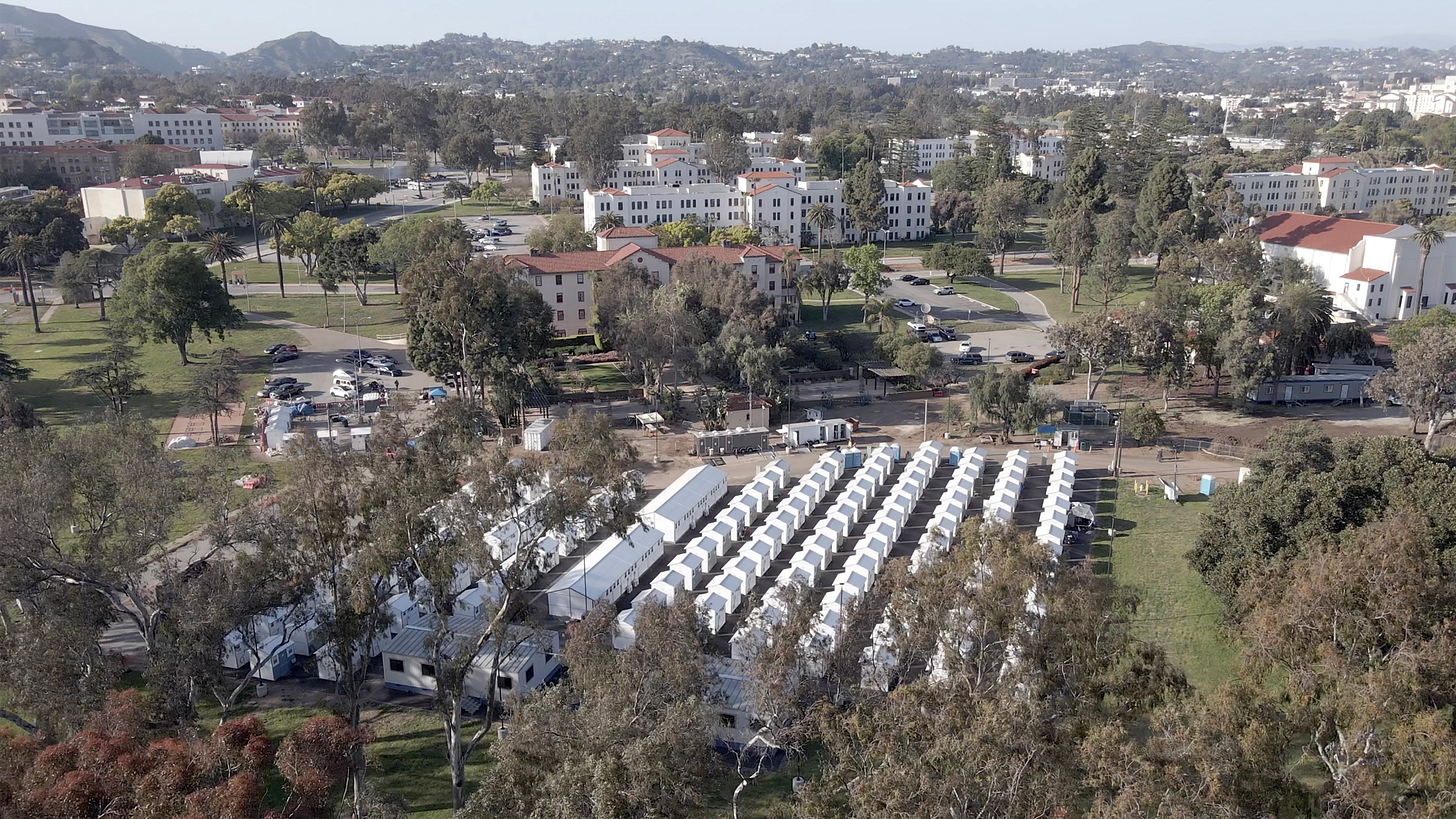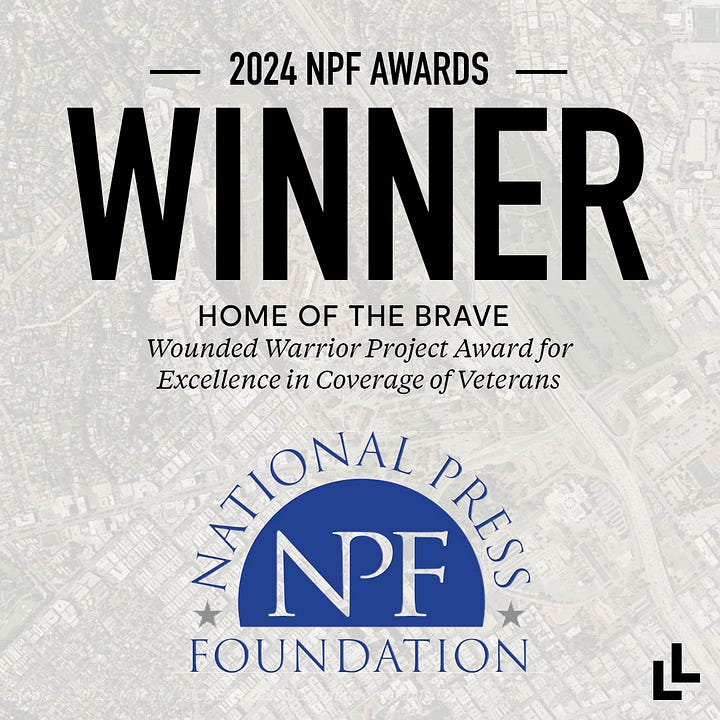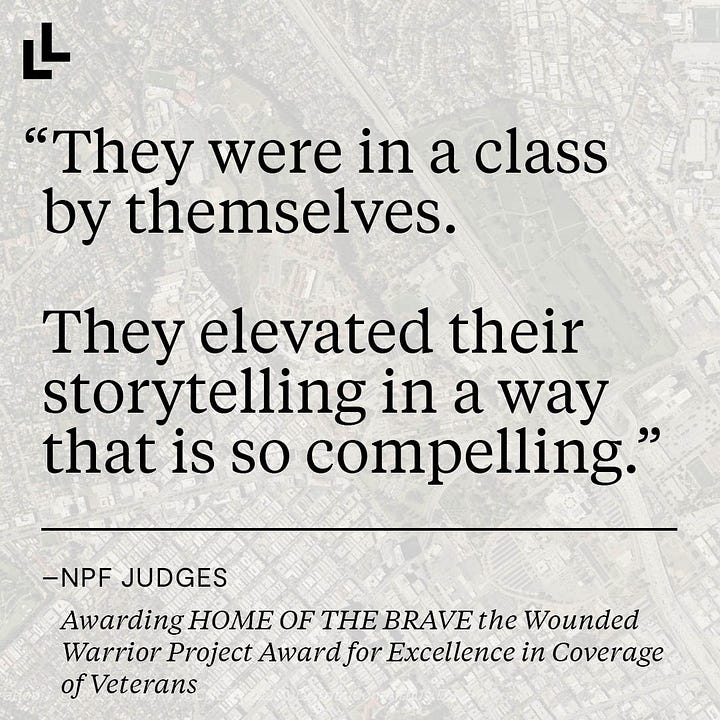Opening brief filed in appeal as wildfire-evacuated veterans return to VA campus
Court papers filed ahead of an April rematch show the VA’s argument for why it should be able to continue leasing land donated for veteran housing to third parties.

After being evacuated over wildfire concerns last week, hundreds of veterans have returned to the VA’s West LA campus, where they face an endemic housing challenge made even worse by conflagrations that left the Pacific Palisades and Altadena neighborhoods in ruins.
The American Legion reported over 100 veteran members had lost homes in the Palisades fire. Estimates for Altadena were not immediately available, but a sizable loss can be expected given the destruction of 15,000 structures countywide. A spokesperson from the VA said the department doesn’t have a veteran housing loss count.
“Veteran homeless numbers are out the window,” says veteran and veteran advocate Robert Reynolds.
Some 200 veterans who evacuated the VA property live on campus in temporary tiny homes or shelters, and have been waiting for years to be housed in hundreds of campus apartments to be built by the federal government on the land.
The returning veterans also face uncertainty over the VA’s decision to appeal U.S. District Judge David O. Carter’s landmark order to add hundreds more temporary housing units and at least 1,000 permanent homes to the agency’s current housing plans.
This newsletter reports on how veterans are fighting for housing at the West LA VA through Powers v. McDonough, a class-action lawsuit filed against the Department of Veterans Affairs. Get updates on the case here:
The government filed its opening brief for the appeal on Friday, Jan. 17, as wildfires continued to consume areas surrounding the VA property.
The Department of Justice is appealing Carter’s September 2024 ruling in favor of a class action of disabled veterans who sued the federal government over slow progress on housing construction on the VA campus. As a result of the case, Carter ordered the department to furnish hundreds of additional temporary housing units, and add more than 1,800 permanent apartments to the total it had committed to in a prior, nearly decade-old court settlement agreement.
The West LA VA campus currently houses more than 700 veterans in treatment programs, tiny houses, shelters, and apartments. But only 307 of the 1,200 permanent supportive apartments the VA promised under the 2015 settlement have opened, though more units are on the horizon, the agency says in its court papers.
Plaintiffs contend that the VA’s failure to create campus housing has left veterans with serious mental illness and traumatic brain injuries to live on the streets, making it difficult to obtain treatment. They also say the VA unlawfully leases a baseball field, athletic facilities for a private school, oil drilling rights, and parking lots to private parties, diverting valuable land that could be used for housing.
In Friday’s appellate brief, the VA argues the judge erred in finding that it had violated the Rehabilitation Act by failing to house more veterans on campus. Nothing is more important to the agency than ending veteran homelessness, the VA says, adding that in LA the numbers of vets experiencing homelessness had dropped by a quarter from 2023 to 2024. (Nearly 3,000 veterans were tallied in the county's 2024 homeless count.) But it argues veteran benefits, including housing, must be decided on a case-by-case basis through an existing administrative system.
The VA’s appeal also says Carter’s ruling would force the agency into an “exorbitant” building program that would undermine its carefully considered approach to ending veteran homelessness, taking away housing opportunities from other disabled veterans. Congress authorized campus housing by developers who obtain their own financing, not by the VA with its limited funds and expertise in building, the DOJ says in its papers.
Get the whole story: An epic government scandal hiding in plain sight


Home of the Brave is a newsletter and an award-winning, multimedia feature documenting the unhoused veteran crisis at the West LA VA campus. Over the last 50 years, the land was carved up and leased to private interests, while development for veteran housing has been painfully slow. A land grab dating back to the U.S. Civil War, the history of this property is a tale of government malfeasance, neglect, graft, and even death.
As a part of the government’s appeal, the VA also joined UCLA’s bid to retain its Jackie Robinson Stadium on the veterans’ campus. UCLA’s lease is one of four rental agreements Carter struck down for failing to primarily serve veterans. The VA and UCLA contest the veterans’ contention that the original 1888 deed donating the property barred using the land for anything that did not contribute to operating a home for disabled veterans.
UCLA, in its own appeal, also argues its overall service to veterans, including medical care provided by university physicians and medical students, more than fulfilled the mandate that veteran benefits be the lease’s “predominate focus.” The university says it provided veterans more than $320,000 in annual stadium rent and in-kind services totaling more than $3 million, more than enough to justify its on-campus presence.
The university says Judge Carter improperly added it as a defendant as the trial wrapped up, and demands restitution, in an amount to be set later, for the month-long stadium lockout the judge imposed in the midst of post-trial discussions of possible remedies for the harm he found.
Day 10: UCLA rep says its baseball field doesn't principally serve vets — and never has
Questions surrounding UCLA baseball’s Jackie Robinson Field led off the tenth day of the Powers v. McDonough trial, a day after Judge David Carter and attorneys toured the site on the We…
Brentwood School is also appealing to uphold its own lease to maintain its aquatic and athletic facilities on campus land. The K-12 private academy earlier had agreed to a million-dollar settlement that would have given veterans use of its state-of-the-art workout and training facilities more than 50 percent of the time.
Now, without mentioning the settlement, Brentwood argues the services it already provides, including special educational and athletic programs for veterans and their families, and scholarships for their children, are more than adequate to justify its lease. The school says it also pays $820,000 rent, and provides food to veterans, including kosher and gluten-free options.
While it did not join Brentwood School’s appeal, the VA says in its papers it plans to renegotiate terms with the private academy. The VA also seeks to restore its authority generally to negotiate leases, which Carter had curbed, citing agency “mismanagement” of the land.
Bridgeland Resources, LLC is also appealing the judge’s order, saying its license to slant drill under the campus does not affect land that could be used for housing.
The plaintiffs will respond to the VA’s filing and other legal arguments in writing next month. The 9th U.S. Circuit Court of Appeals has set an April hearing for the case.







